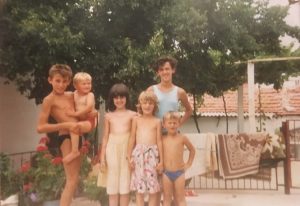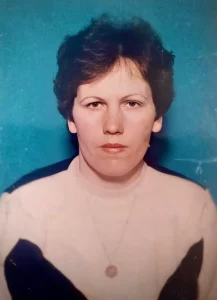
Smajo Bešo OBE
Smajo Bešo has seen the worst and best of humanity. After surviving the horrors of the genocide in Bosnia, he found refuge and safety in the UK where he now proudly embraces his Bosnian roots and new-found Geordie identity.
People resorted to eating grass and chicken feed just to stay alive.

Smajo Bešo (second on the left) with family in Bosnia
I was born on 29 March 1985 in Stolac, a small town in southern Bosnia. By 1991, when my parents were in their 30s, we had recently moved into our home they had personally designed and built. My childhood was simply amazing. However, by August 1993, I had been living in a war zone for over a year. In the spring of 1992, our town was surrounded by the Yugoslav army, but it was really a Serbian army under the control of Slobodan Milošević. Initially, soldiers would drop in for coffee and tea – after all, these were familiar faces, friends whom my parents had known and grown up alongside.
But the situation swiftly took a turn for the worse. One day, a soldier who had been a constant presence, visiting daily for tea and coffee, arrived at our home. I rushed towards him as I always did, but he pushed me away while launching into a tirade about Muslims. To my horror, he took out a knife and began sharpening it, proclaiming that it was a good day to slit throats. Luckily for us, another Serbian friend, a soldier, was nearby and came to our rescue.
Prior to that, Bosnia was a country where neighbours of diverse ethnicities and religions got on very well. I was brought up in a Muslim family but never thought of myself as being different from our Serb and Croat neighbours. In fact, at Christmas, I went to our Catholic neighbour’s home, while they gave my family gifts during Eid.
However, by 1991, it had become politically acceptable to compare Bosnian Muslims to disease and vermin. I was old enough to sense things changing around me but did not fully appreciate what was happening although I still picked up bits of information from exchanges that my parents and other adults had around me.
I remember coming home one day to find my mother in tears, in front of the TV, which was my first real indication that something was wrong. She tried to hide her tears, but I could see the anguish on her face. It was only years later that I realised she must have been watching news reports about the conflict engulfing the nation.
My father, Dzemal, joined the local army and stood alongside his Croatian friends and neighbours in opposition to the occupying Serbian army. However, a year into the war, Bosnian Croats turned on their fellow soldiers of Bosniak Muslim descent. My father, along with all my other male relatives, was arrested and sent to a concentration camp.
In August 1993, soldiers arrived in our village and made terrifying threats of violence, including rape and murder. We were taken to a so-called ‘collection centre’ – a factory where my father used to work. There, along with my mother and two siblings, and hundreds of other people, we were interrogated and searched. My mother was forced to sign a document to say she was giving up everything we had for safe keeping. We were then forcibly loaded onto cattle trucks. We had no idea where they were going to take us – we thought we would all be killed.

Smajo’s auntie Emina
Along the way to a new location, I could not help but notice a trail of abandoned possessions strewn along the roadside. After several hours on the road, we were dropped off near Bosnian government-controlled territory and had to walk the rest of the way. At one point, I stepped over what appeared to be a pile of clothes, only to realise that it was the lifeless body of an elderly man.
We eventually found refuge in a town called Mostar, surrounded by the Serbian army on one side and the Croatian army on the other. The living conditions were horrific as we were shelled and bombed daily. We had no food, water, or electricity. People resorted to eating grass and chicken feed just to stay alive. The severity of our situation was exacerbated by an unbearably harsh winter.
We started school during the siege as an act of defiance, it was our way of resisting. On 24 January 1994, our final day of school, Croatian forces dropped bombs on Mostar. Standing by the classroom window, I saw our street and neighbourhood engulfed in flames. My worst fears were confirmed when I returned home to find that my auntie Emina had been severely wounded by shrapnel across the abdomen. She died at the city’s makeshift medical facility.
Losing someone so close to me was particularly difficult. She had a constant smile on her face and provided for us. And then, in an instant, she was gone. As anger surged inside me, my mother did something extraordinary. She sat me down and emphasised the importance of not succumbing to hate, unlike those who wished to harm us. I have never forgotten her words of wisdom.
On the 19 June 1994, we were given two hours to pack our belongings, we were going to the UK to be reunited with my father. He had survived and was flown to the UK by the British Red Cross. After a month in a refugee camp in Croatia, we eventually made our way to England. I was nine when we arrived in Newcastle as refugees and saw my father for the first time in over a year.
My father had come to the UK on 19 January 1994; we left Bosnia on 19 June 1994, and we arrived in Newcastle on 19 July that same year. The number 19 is our lucky number! That said, leaving behind one’s home, culture, friends, and neighbours is not a choice anyone willingly makes. For a while, I yearned to return to Bosnia. However, the people of Newcastle embraced us into their community with open arms. Nowadays, I identify as both a Bosnian and a Geordie!
In 2020, I founded the Bosnian Genocide Educational Trust. I was subsequently honoured to be awarded an OBE for services to genocide education and commemoration in the 2023 New Year Honours list.


